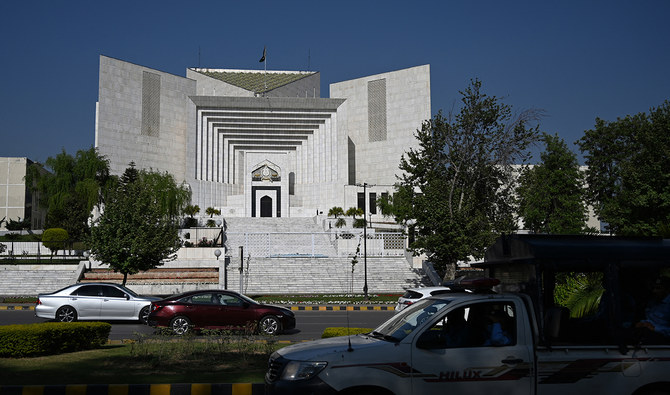ISLAMABAD: Chief Justice of Pakistan Qazi Faez Isa said on Wednesday a full Supreme Court bench could be formed to hear a case involving accusations by six high court judges of interference and intimidation by the country’s powerful intelligence agencies in judicial decisions.
In a letter addressed to the Supreme Judicial Council watchdog last week, six judges of the Islamabad High Court (IHC) accused the military’s Inter-Services Intelligence agency (ISI) of intimidating and coercing them over legal cases, particularly “politically consequential” ones. The judges provided various examples of alleged interference, including a case concerning Pakistan’s imprisoned former prime minister Imran Khan. The letter also mentioned incidents where the judges said their relatives were abducted and tortured and their homes were secretly surveilled, aiming to coerce them into delivering favorable judgments in specific cases.
On Monday, the Supreme Court took suo motu notice of the case, using provisions in Pakistani law that allow the top court to open cases on its own initiative, and said hearings would commence from Wednesday by a seven-member bench. Separately, the government of Prime Minister Shehbaz Sharif last week also formed an inquiry commission to investigate the matter, but the retired judge appointed to head the body has since recused himself, throwing the process into uncertainty.
“We may constitute a full court next time after consultation [among judges],” the chief justice said during the hearing while explaining why a seven-member instead of a full Supreme Court bench had been set up to hear the case, adding that all SC justices were not currently available in Islamabad.
“We are taking this matter very seriously,” the chief justice added. “If there is any kind of attack on the judiciary’s independence, I would be at the frontline and for sure, my fellow judges would be standing with me in this.”
Isa reassured the six high court judges that misconduct proceedings would not be initiated against them for highlighting the matter.
“There is zero tolerance on the independence of the judiciary,” he remarked.
Justice Athar Minallah, another judge on the panel, highlighted the highhandedness of the executive during his remarks:
“What they [six IHC judges] have pointed out is a normalization of a culture of deviance on the part of the state. That is the question which is of public importance.”
Justice Mansoor Ali Shah called for the formulation of a “stringent code” to prevent future interference in judicial affairs.
“Things have been happening and we cannot sit burying our heads in the sand like ostriches,” he said. “It is our duty to maintain the independence of the judiciary, we have to lay down a stringent code which ensures that such interference doesn’t take place.”
Attorney-General Mansoor Usman Awan assured the court of the government’s full support in the case and reiterated its resolve to uphold the independence of the judiciary.
The CJ later deferred the matter till April 29, hinting that a full court could be formed then to hear the case.
PAST INVOLVEMENT
In February 2019, the Supreme Court delivered a scathing verdict on the military and intelligence agencies exceeding their mandate and meddling in politics over their handling of protests in 2017 by a religious-political party.
The Supreme Court had been investigating the “Faizabad protest,” which saw a hard-line group paralyze the capital Islamabad, accusing a minister of blasphemy. The inquiry also looked at the role of security agencies, including in ending the standoff through mediation.
Seven people were killed and nearly 200 wounded when police initially tried but failed to remove protesters.
The military is widely seen to have disagreed with civilian authorities at the time over how to handle the protests. The army’s role particularly came under criticism after video footage shared on social media showed a senior officer from the ISI giving cash to protesters after a deal was struck to end the blockade.
“The involvement of ISI and of the members of the Armed Forces in politics, media and other ‘unlawful activities’ should have stopped,” Supreme Court Justices Mushir Alam and Qazi Faez Isa, who was not the chief justice at the time, said in their verdict.
“Instead when (protest) participants received cash handouts from men in uniform, the perception of their involvement gained traction.”
In the past, Imran Khan’s main opponent, PM Sharif’s Pakistan Muslim League-Nawaz (PML-N), had also accused the ISI of intimidating court decisions, including those that led to convictions of his elder brother Nawaz Sharif after his ouster from the prime minister’s office in 2017.
The powerful army plays an oversized role in Pakistani politics. The country has been ruled by military regimes for almost half its history since independence from Britain in 1947. Khan and the elder Sharif both have alleged that they were ousted by the military after they fell out with the generals.
The army denies it interferes in political matters. It has so far refrained from commenting on the judges’ letter regarding the ISI’s alleged interference and intimidation.












